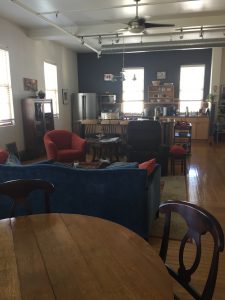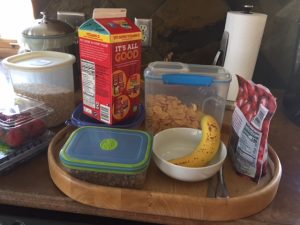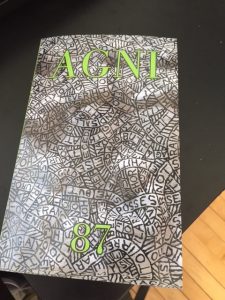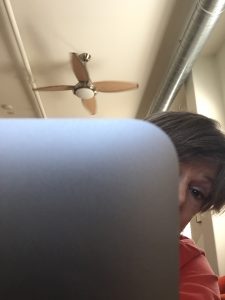 It’s 16 steps from our dining room table to the kitchen. Jerry prefers a complex mixture of dry cereal, granola, nuts, dried cherries, banana, and milk. Both of us also like cut-up fresh strawberries and blueberries on our cereal. Both of us like orange juice. I eat cooked oatmeal with ground flaxseed and yogurt. Plus, there are our vitamins. It's all up to me. In the first week of Jerry’s convalescence I clocked more daily steps on my Fitbit than before his surgery.
It’s 16 steps from our dining room table to the kitchen. Jerry prefers a complex mixture of dry cereal, granola, nuts, dried cherries, banana, and milk. Both of us also like cut-up fresh strawberries and blueberries on our cereal. Both of us like orange juice. I eat cooked oatmeal with ground flaxseed and yogurt. Plus, there are our vitamins. It's all up to me. In the first week of Jerry’s convalescence I clocked more daily steps on my Fitbit than before his surgery.  Necessity, however, is the mother of invention. Why have I never thought of a tray before? I can load it full and cut over half the trips. Then I load the dishwasher, clean up, add to my grocery list, get Jerry situated on the bed for his small exercises. Go wash my face and start my bathroom routine while he’s doing that. Then I come back and prop three pillows under his feet so he can lie there awhile to help reduce the swelling. I’ve gotten us here only until about 9:30. Oh no, the day begins much earlier. At 1 a.m. I am helping him into his (rented) recliner to spend the rest of the night because the brace becomes too uncomfortable in bed. I bring him water and pills. Then also I forgot the pre-breakfast routine, where I help him get partially dressed, feed Wally, clean the two lumps of misdirected kitty-poop off the floor. You get the idea. This will go on for three months, total. His left hip is not to bear any weight until the bone grafts and screws have firmly attached themselves.
Necessity, however, is the mother of invention. Why have I never thought of a tray before? I can load it full and cut over half the trips. Then I load the dishwasher, clean up, add to my grocery list, get Jerry situated on the bed for his small exercises. Go wash my face and start my bathroom routine while he’s doing that. Then I come back and prop three pillows under his feet so he can lie there awhile to help reduce the swelling. I’ve gotten us here only until about 9:30. Oh no, the day begins much earlier. At 1 a.m. I am helping him into his (rented) recliner to spend the rest of the night because the brace becomes too uncomfortable in bed. I bring him water and pills. Then also I forgot the pre-breakfast routine, where I help him get partially dressed, feed Wally, clean the two lumps of misdirected kitty-poop off the floor. You get the idea. This will go on for three months, total. His left hip is not to bear any weight until the bone grafts and screws have firmly attached themselves.  I’m sick of writing about such things, but such things are my life. Then I read the introduction to the new issue of Agni Magazine by its splendid editor, Sven Birkerts. Sven begins with his personal version of what we already know, that the “pile-up of consequential events is straining our ability to respond and changing the way we inhabit our lives.” He says he finds it hard to remember how things were before. Not that it hasn’t occurred to me before, but my life, fraught with constant calls for my attention, is a perfect mirror of what’s happening to us all, right now. Too much, too much. All Breaking News. Sven puts it: “To tune in is to be plunged into a quasi-hypnotic state, an ever-urgent ‘feed.’ It also occurs to me that the dwindling away of the dependent clause in poetry and in all writing, pretty much, these days is another perfect mirror of our inability to assign relative value. It’s all Breaking News. Nothing, as Sven says, is in the background. It’s all foreground.
I’m sick of writing about such things, but such things are my life. Then I read the introduction to the new issue of Agni Magazine by its splendid editor, Sven Birkerts. Sven begins with his personal version of what we already know, that the “pile-up of consequential events is straining our ability to respond and changing the way we inhabit our lives.” He says he finds it hard to remember how things were before. Not that it hasn’t occurred to me before, but my life, fraught with constant calls for my attention, is a perfect mirror of what’s happening to us all, right now. Too much, too much. All Breaking News. Sven puts it: “To tune in is to be plunged into a quasi-hypnotic state, an ever-urgent ‘feed.’ It also occurs to me that the dwindling away of the dependent clause in poetry and in all writing, pretty much, these days is another perfect mirror of our inability to assign relative value. It’s all Breaking News. Nothing, as Sven says, is in the background. It’s all foreground.  So where are our personal boundaries? he wonders. Where is the “I” when all is one giant news feed? Where is the writer in all this? “If our age’s drive is toward both speed and dispersion, or distraction, the making and encountering of art represent exactly the opposite principles. Art has always been about deceleration and attention. The made thing embodies labor and deep patience, and its nuances enforce slowness,” Sven writes. Hence, my opening passage. See. Here we are. Slowly living our lives. Even so, the unspoken tensions, the constant crises we all feel, are felt within the small, personal narrative. My overload is magnified by the national news overload. Inescapable. Yet art is the “locus of encounter,” as Sven says, “where meanings are tested.” I think of “tested” as seen and sorted out, given relative value. As in, my life is crucial, here, at this moment.
So where are our personal boundaries? he wonders. Where is the “I” when all is one giant news feed? Where is the writer in all this? “If our age’s drive is toward both speed and dispersion, or distraction, the making and encountering of art represent exactly the opposite principles. Art has always been about deceleration and attention. The made thing embodies labor and deep patience, and its nuances enforce slowness,” Sven writes. Hence, my opening passage. See. Here we are. Slowly living our lives. Even so, the unspoken tensions, the constant crises we all feel, are felt within the small, personal narrative. My overload is magnified by the national news overload. Inescapable. Yet art is the “locus of encounter,” as Sven says, “where meanings are tested.” I think of “tested” as seen and sorted out, given relative value. As in, my life is crucial, here, at this moment.
My Wobbly Bicycle, 151
in Archive
